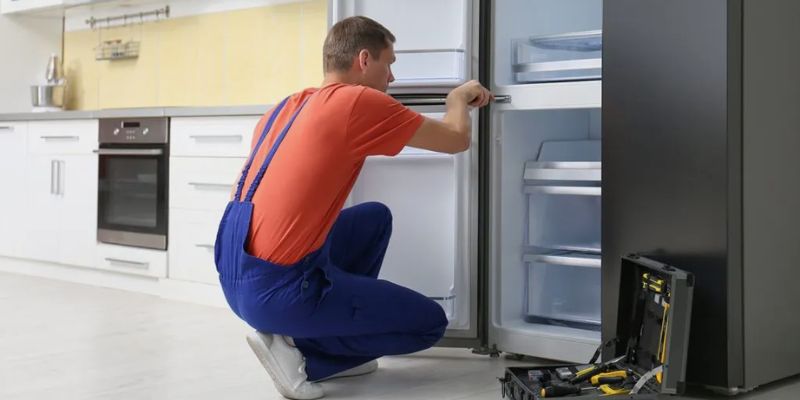Your refrigerator is one of the most used appliances in your home, quietly working around the clock to keep your food fresh and safe. But like any hard-working machine, it needs a little TLC to keep running efficiently. Rather than waiting for a breakdown that results in spoiled food and costly repairs, a proactive approach can help you avoid many common issues. So how can you prevent future refrigerator repairs? This guide covers everything you need to know.
1. Keep the Coils Clean
Dust and debris can accumulate on your refrigerator’s condenser coils over time. These coils are responsible for releasing heat, and when they get clogged, the system has to work harder to cool your food. This added pressure can cause the system to overheat, potentially leading to parts wearing out or breaking down.
Make it a habit to clean the coils at least twice a year using a coil brush or a vacuum with a hose attachment. You’ll usually find them either behind or underneath the appliance.
| Pro Tip: Unplug your fridge before cleaning the coils to avoid electrical hazards and ensure safety. |
2. Check the Door Seals
A faulty or loose door seal lets cold air escape, forcing your refrigerator to work overtime. Poor door seals can cause cold air to leak, forcing your refrigerator to work harder and increasing energy consumption.
To check if your gasket is working properly, place a piece of paper or currency between the door and the frame. If it slides out with little resistance, your seal likely needs replacing. Cleaning the seals regularly with warm soapy water can also extend their life and prevent mold buildup.
3. Don’t Overload Your Fridge
Stuffing your fridge to the brim might seem convenient, but it blocks airflow and affects cooling efficiency. Air needs to circulate freely to maintain even temperatures throughout the interior. Packing too many items into your fridge forces the compressor to overwork, which can accelerate its deterioration over time.
Try organizing your food with space in mind. Leave gaps between items and don’t cover air vents.
4. Set the Right Temperature
Setting your refrigerator too cold can freeze certain foods and stress the motor, while setting it too warm invites bacterial growth and spoilage. Most refrigerators perform best when set between 35 and 38 degrees Fahrenheit, ensuring optimal food preservation.
Use a refrigerator thermometer to monitor internal temperature. If your appliance doesn’t have a built-in digital display, an inexpensive analog thermometer works just as well.
5. Keep the Gaskets Moist
Door gaskets, the rubber linings that form the seal around the door, can dry out and crack over time. This results in energy loss and cooling inefficiency. A small amount of petroleum jelly or gasket conditioner can be used to keep them pliable and effective.
Inspect them monthly and apply lubricant as needed to maintain flexibility and sealing power.
6. Defrost the Freezer When Needed
While many modern refrigerators are frost-free, older models may require manual defrosting. Allowing ice to build up can reduce cooling performance and increase energy use. If the frost buildup exceeds a quarter inch, it’s time for a defrost session.
Turn off the appliance and let the ice melt completely. Use towels to soak up excess water and never use sharp tools to remove ice, as this can damage the interior walls.
7. Maintain Proper Clearance
Your refrigerator needs breathing room. If it’s shoved tightly against the wall, it can’t release heat efficiently. Always maintain a few inches of clearance between the refrigerator and the wall to allow proper airflow and prevent overheating. If the sides are also close to cabinets, ensure those gaps allow for adequate ventilation too.
Good airflow extends the life of your compressor and helps the entire cooling system function more efficiently.
8. Avoid Frequent Door Openings
Each time you open the fridge door, it lets warm air in and pushes cold air out, forcing the system to work harder to maintain temperature. This constant change in temperature can wear out the thermostat and compressor. Make it a habit to open the fridge only when needed and close it quickly.
Encouraging your family members, especially kids, to decide what they want before opening the door can also make a big difference.
9. Check the Drip Pan and Drain Hole
Your refrigerator has a drain hole and drip pan that collect excess moisture. If these get clogged with debris or mold, it can lead to water pooling inside the fridge or even leaking onto your floor.
Remove the drip pan and clean it with warm water and vinegar. Gently clean out the drain hole using a thin brush or pipe cleaner to remove any clogs or debris.
| Pro Tip: Doing this simple maintenance every three to six months can prevent water damage and mold issues. |
10. Schedule Preventive Maintenance
Even if your fridge seems to be working perfectly, professional maintenance once a year can detect minor issues before they turn into major problems. A qualified technician can inspect components, test functions, and ensure optimal performance.
Salt Life Appliance Repair offers preventive maintenance packages that help keep your fridge running smoothly while saving you from expensive emergency repairs.
Final Thoughts
Preventing refrigerator repairs is not only about saving money but also about preserving the heart of your kitchen. With just a little effort and routine upkeep, you can extend the lifespan of your appliance, improve energy efficiency, and avoid the stress of emergency breakdowns. Simple habits like cleaning coils, checking gaskets, and avoiding overloading can go a long way in ensuring long-term performance.
And remember, if you ever need expert help, Salt Life Appliance Repair is just a call away.
FAQs About Refrigerator Maintenance
How often should I clean fridge coils?
At least twice a year. If you have pets or live in a dusty environment, do it every 3-4 months.
What are signs that my refrigerator is about to fail?
Warning signs include strange noises, inconsistent temperatures, water leakage, and food spoiling quickly.
Can I replace a door gasket myself?
Yes, many gaskets are DIY-friendly and just snap into place. Make sure to purchase the correct size and model.
Should I unplug my refrigerator when cleaning?
Yes, always unplug before doing any deep cleaning or maintenance to avoid shocks and protect internal systems.
How long does a typical refrigerator last?
With proper care and maintenance, most refrigerators can last 10 to 15 years or more.

